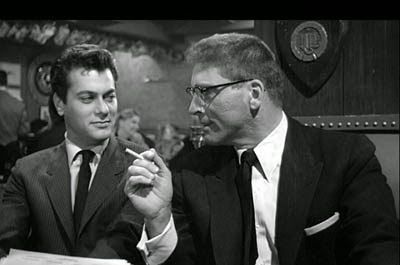SPOILER ALERT! The plot of the movie will be discussed.
Sorry, I don’t have a holiday movie to discuss. But you’re
probably tired of seeing them on TV at this time of the year anyway.
Although the movie seems dated now with its lingo and
relative lack of violence, it does mirror the conflicts that were gestating
during the 1950's between the established authority and the discontented youth.
When the gang drives into town, they disrupt a motorcycle race sanctioned by
the citizens. The same activity is either accepted or rejected depending on who
is running the event. The bikers mock the race's organizers who want to tell
them what they can't do. As they ride in, the youth of the town are shown to be
excited as they watch the cool looking bikes. The faces of their elders reflect
fear. The local bartender is an exception because he is willing to forget their
anti-establishment ways if he can make a buck off of them by selling beer.
Small actions or words illustrate the themes of the film. The
slang and music show the lack of communication between the generations. When
Johnny is given a glass for his beer, he ignores it, and drinks from the
bottle. Somebody asks Johnny, "What are you rebelling against?" His
total rejection of society is revealed when he responds, "What've you
got?" Johnny is attracted to the police chief's daughter, Kathy. He asks
her what happens in her town. She says that roses grow, people get married, and
her father once promised to take her fishing, but it didn't happen. The banal
life she is leading makes her attracted to the bad boy Johnny. He tells his
friends that they will stay in the town for a while to "wait for
crazy." He and his gang can only exist in chaos.
The bikers' rowdy behavior creates destruction at the bar
and a hair salon. They are noisy and harass girls. Ironically, they are accused
of crimes they do not commit. A double legal standard exists in the town. The
citizens want Lee Marvin's rival biker to go to jail during a confrontation,
but want the driver of a car who hits a biker to be set free. Kathy's father keeps trying to smooth things
over, taking the path of least resistance, and only arrests Marvin. The bikers
exact justice by putting the civilian in jail, too. They take the place of the
ineffective police. Then, the citizens go outside the law as vigilantes when
the police don't crack down. They throw a tire iron at Johnny, who falls off
his bike. The out-of-control bike (symbolizing the whole town at this point)
kills one of its elderly citizens. Johnny is wrongly accused of killing the
man, until a few fair citizens come to his rescue.
When Kathy is
harassed by the gang, Johnny rescues her, and rides her away into a park area, a
kind of sanctuary far from the confrontations. He is a torn individual. He
admits during a beating that his father hit him hard, so we get a glimpse of an
abused childhood that may have set him on his path. He may reject society, yet
he clings to a stolen motorcycle race trophy, showing his desire to be accepted
by society. He rejects a biker girl in favor of the "square" Kathy,
but he treats her roughly, despite her admitting her attraction to him and his
life. She is a policeman's daughter, and he says "you think you're too
good for me." She represents what he wants, acceptance, and what he
despises, the authority of the "square" world.
Since they are from worlds at war, they cannot be together. But,
Johnny finds some peace with the fact that he is justly set free and has found
a person in Kathy from the other camp who understands him. Since he feels
accepted for the moment at least, he no longer needs the trophy, gives it to
Kathy, and shows his only smile in the film as he rides off.
Many actors feel that Brando was the ultimate actor. Do you
agree with them?
Next week’s film is Midnight
Cowboy.
















